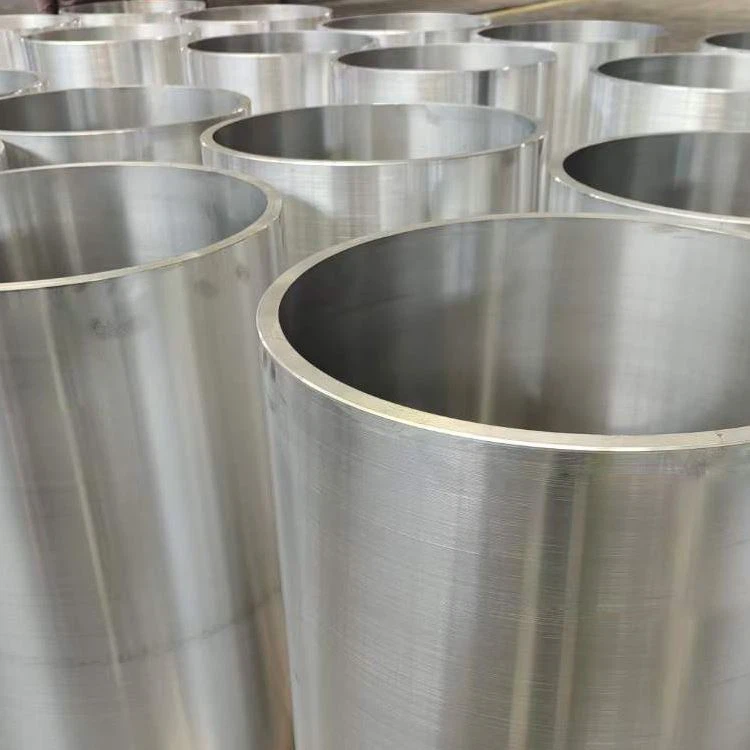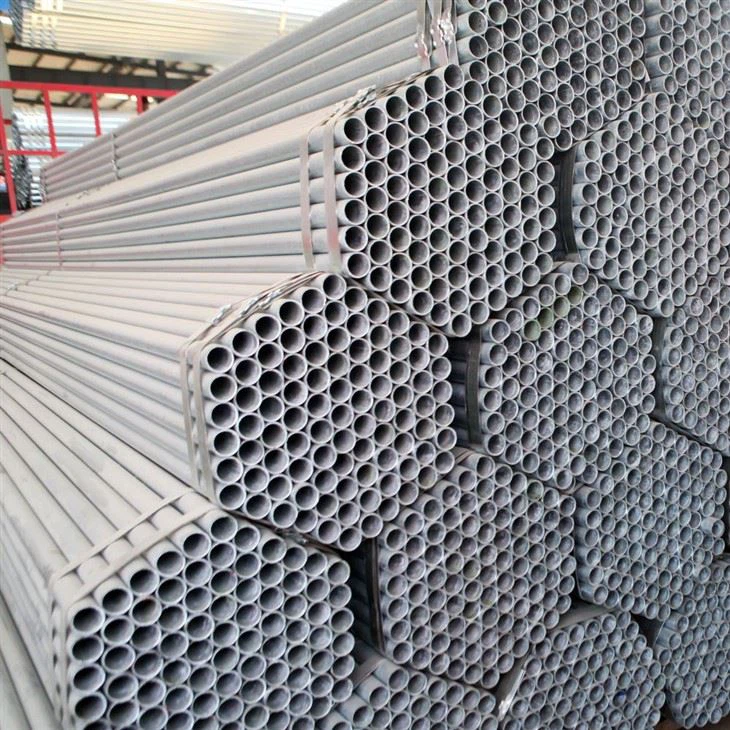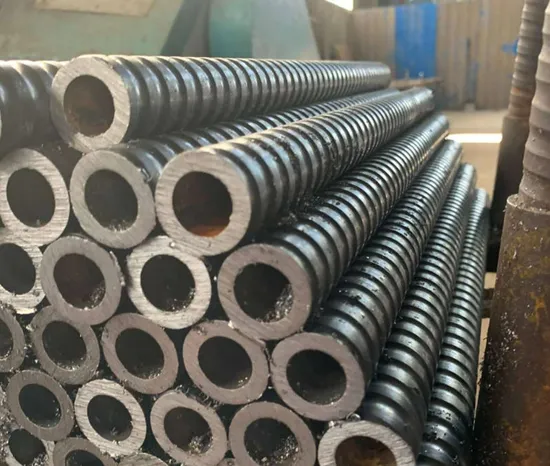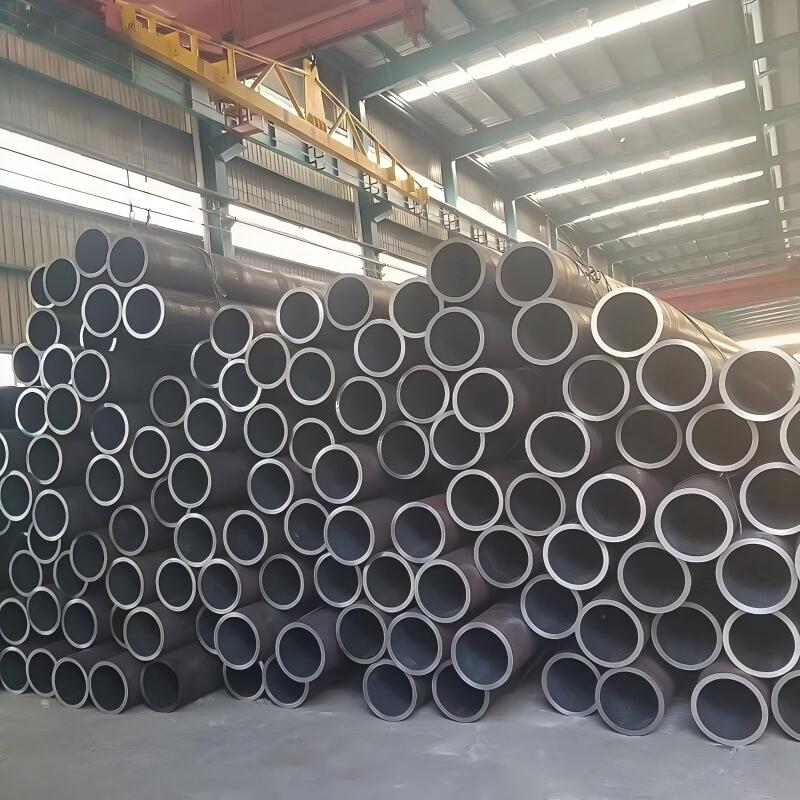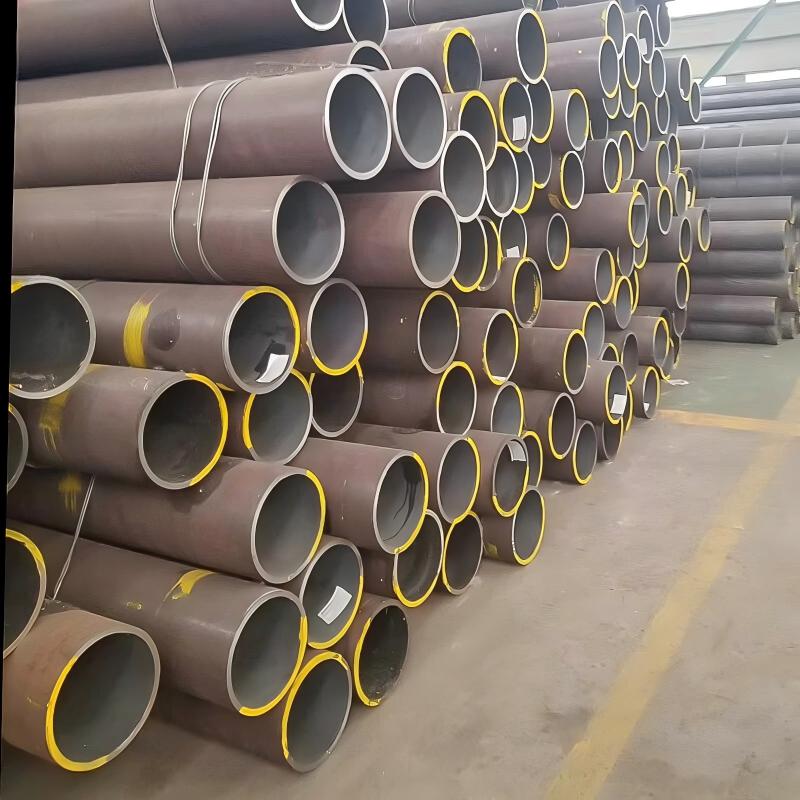1. Material Composition & Forging Process
Forged 7075-T6 pipes conform to AMS 4148, ASTM B247, and ASME SB247 standards, featuring optimized zinc-copper-magnesium composition for ultra-high strength applications:
Alloy Composition:
Zinc (Zn): 5.1-6.1% (primary strengthening element)
Magnesium (Mg): 2.1-2.9% (forms MgZn₂ precipitates)
Copper (Cu): 1.2-2.0% (enhances stress corrosion resistance)
Base Material:
Aluminum (Al): ≥88.0% (balance)
Trace Elements:
Chromium (Cr): 0.18-0.40% (grain refinement)
Iron (Fe): ≤0.50% max
Silicon (Si): ≤0.40% max
Forging Process Specifications:
Preform heating: 370-420°C
Forging temperature: 340-380°C
Reduction ratio: 4:1 to 6:1 minimum
Grain flow orientation: Longitudinal alignment (±10°)
Press capacity: 10,000-50,000 ton hydraulic
Forging strain rate: 0.5-5 sec⁻¹
Third-party verification per NADCAP AC7101 confirms homogeneity with <3% elemental deviation. Complies with MIL-F-7216 for aerospace applications and ISO 6363-2 for extruded precision tubes.
Forged 7075-T6 demonstrates superior mechanical properties compared to standard extrusions:
| Property |
Forged Pipe |
Standard Extrusion |
Test Standard |
| Ultimate Tensile Strength |
560-580 MPa |
525-550 MPa |
ASTM E8/E21 |
| Yield Strength (Rp0.2) |
490-510 MPa |
460-480 MPa |
ASTM E8/E21 |
| Elongation at Break (%) |
8-12% |
5-9% |
ASTM E8/E21 |
| Fracture Toughness |
36 MPa√m |
28-32 MPa√m |
ASTM E399 |
| Shear Strength |
325 MPa |
300 MPa |
ASTM B769 |
| Fatigue Strength (10⁷) |
160-180 MPa |
140-155 MPa |
ISO 1099 |
| Stress Rupture (100hr/150°C) |
260 MPa |
220 MPa |
ASTM E139 |
| Compression Strength |
540 MPa |
500 MPa |
ASTM E9 |
Improved directional properties provide 12-15% higher transverse strength and superior damage tolerance under cyclic loading.
3. Heat Treatment Process
Specialized T6 treatment sequence for forged components:
Solution Treatment:
465-485°C (±5°C) for 2-3 hours
Controlled atmosphere: Argon gas blanketing
Rapid Quench:
Polyalkylene glycol solution (30% concentration)
Quench speed: >200°C/sec core cooling
Agitation: 1.0-1.5 m/sec flow velocity
Stress Relief:
Cryogenic treatment at -70°C for 2 hours
Artificial Aging:
120-125°C for 24 hours + 165-170°C for 8 hours
Double-stage aging for optimized η’ phase precipitation
Microstructural Features:
Grain size: ASTM 7-8 (15-30μm)
Precipitate density: 10¹⁷/m³ η’ phase (MgZn₂)
Forging texture intensity: 4.5-5.5 multiples random
Inclusion rating: A0.5/B0.5 per ASTM E45
Recrystallization: <10%
4. Dimensions & Customization
Precision-forged pipe specifications:
| Parameter |
Standard Range |
Precision Grade |
Custom Options |
| Outer Diameter |
25-600 mm |
±0.05% OD |
Oval/hex profiles |
| Wall Thickness |
3-50 mm |
±5% WT |
Tapered walls |
| Length |
1-12 m |
+0/-1.5 mm |
Up to 20m |
| Straightness |
– |
0.25 mm/m |
±0.1 mm/m |
| Wall Concentricity |
≤0.5% TIR |
≤0.2% TIR |
≤0.1% TIR |
| Surface Roughness |
Ra 1.6μm |
Ra 0.4μm |
Mirror finish |
Advanced Fabrication:
Radial forging for seamless reduction
Rotary piercing for hollow blooms
Mandrel-assisted forging for thin walls
Isothermal forging for complex geometries
Flow forming for high-precision bores
Pilger milling for nuclear applications
5. Corrosion Resistance Properties
Environmental Performance Data
| Environment |
Forged 7075-T6 Rating |
Corrosion Rate (μm/yr) |
Protection Systems |
| Marine Atmosphere |
Fair |
25-40 μm/yr |
HVOF WC-17Co coating |
| Industrial SO₂ |
Poor |
100-150 μm/yr |
Electroplated Ni-Cd |
| Stress Corrosion |
Moderate |
SCC threshold 150MPa |
Shot peening + anodizing |
| Alclad 7075 |
Excellent |
<1 μm/yr |
5% clad layer |
| Forged vs Wrought |
+30% SCC resistance |
– |
Optimized grain boundaries |
Protection Technologies:
Plasma Electrolytic Oxidation (PEO):
Thickness: 50-100μm
Hardness: >1500 HV
Ion Vapor Deposition (IVD):
Aluminum coating: 20-50μm
Salt spray resistance: >3000hrs
Electroless Nickel:
Ni-P (9-12%): 25-75μm
Phosphorous content control
6. Machinability Characteristics
Specialized Machining Parameters
| Operation |
Tooling |
Speed (m/min) |
Feed (mm/rev) |
Notes |
| Turning |
PCD inserts |
800-1200 |
0.1-0.25 |
7° positive rake |
| Drilling |
Coated carbide (TiAlN) |
50-80 |
0.03-0.08 |
135° split point |
| Milling |
SiAlN ceramic inserts |
400-600 |
0.05-0.12 |
Trochoidal paths |
| Threading |
TiCN coated taps |
10-15 |
Pitch matched |
75% thread depth |
| Boring |
Cubic boron nitride |
200-350 |
0.04-0.10 |
Dampened bars |
Machining Performance:
Machinability index: 50% (baseline: 6061-T6=100%)
Tool life improvement: 200% with cryogenic cooling
Surface finish: Ra 0.2μm achievable
Chatter resistance: +40% vs extruded pipes
Residual stress control: Post-machining stabilization at 120°C
Chip formation: Segmented chips requiring power-thru toolholders
7. Weldability & Joining Methods
Requires specialized joining techniques due to heat-affected zone (HAZ) sensitivity:
Friction Welding Preferred:
Inertia drive welding parameters:
RPM: 2500-5000
Axial pressure: 250-400 MPa
Burn-off length: 2-6mm
Upset force: 400-700 MPa
Dissimilar welding compatibility:
To titanium: ER4043 filler
To steel: Explosive welding transition joints
Alternative Joining:
Adhesive Bonding:
Epoxy-novolac systems: 45 MPa shear
Surface prep: Piranha etch solution
Mechanical Fastening:
Hi-Lok pins: 220-260 ksi strength
Lock bolts: Vibration resistant to 50g
Diffusion Bonding:
Temperature: 510-530°C
Pressure: 10-15 MPa
Time: 60-90 minutes
| Property |
Value |
Test Standard |
| Density |
2.81 g/cm³ |
ASTM B311 |
| Thermal Conductivity (25°C) |
130 W/m·K |
ASTM E1461 |
| CTE (20-100°C) |
23.6 μm/m·°C |
ASTM E228 |
| Electrical Conductivity |
33% IACS |
ASTM B193 |
| Modulus of Elasticity |
71.0 GPa |
ASTM E111 |
| Specific Heat (200°C) |
1050 J/kg·K |
ASTM E1269 |
| Thermal Diffusivity |
55 mm²/s |
ASTM E1461 |
| Solidus Temperature |
477°C |
ASTM E228 |
| Magnetic Permeability |
1.00002 |
ASTM A342 |
9. Surface Quality Standards
Surface integrity requirements (AMS 2772):
No forging laps or cold shuts
Surface discontinuities: ≤0.1mm depth
Tool marks: ≤0.01mm height
Heat tint control: Max ΔE=1.0
Finishing processes:
Chemical milling: 0.05-0.5mm stock removal
Electropolishing: 20-100μm removal
Vibratory finishing: Surface compression
Inspection methods:
Fluorescent penetrant: Level 3 sensitivity
White light interferometry: 0.1μm resolution
Barkhausen noise analysis for residual stress
10. Certifications & Testing
Quality Assurance Protocols
Material Verification:
Optical emission spectrometry
Ultrasonic spectroscopy for inclusions
Mechanical Testing:
Through-thickness tensile tests
Charpy V-notch at -40°C (>15J required)
Creep testing to 10,000 hours
NDE Requirements:
Phased array UT: 10MHz probes
Digital radiography: ASTM E2662 compliance
Thermographic inspection: 5μm resolution
Industry Certifications
AS9100 Aerospace Quality Management
NADCAP AC7117 for forgings
PED 2014/68/EU Category IV
NORSOK M650 for offshore systems
ITAR compliance for defense
ABS Type Approval for marine systems
Primary Applications: Aircraft landing gear components, missile launch tubes, racing suspension systems, helicopter drive shafts, high-pressure hydraulic cylinders, and structural components requiring superior strength-to-weight ratio.
Delivery Specifications: Vacuum-sealed desiccated packaging, wooden crates with anti-vibration suspension. Standard lead time: 12-16 weeks.

